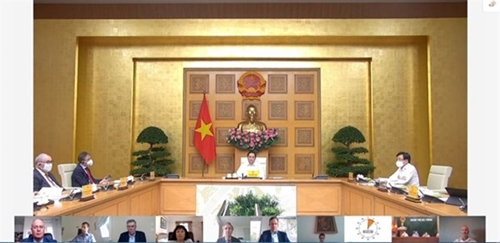The firms, however, stressed the importance of mass vaccination drives, uninterrupted flow of goods and services as well as shorter time to process foreign workers' entry to Vietnam, said Alain Cany, Chairman of EuroCham.
“There is no disguising the fact that this fourth wave outbreak is having a dire impact on business. The EuroCham Business Climate Index is now recording the lowest sentiment in more than a decade," he said.
Measures must be taken to allow workers to go back to work as soon as possible.
    |
 |
|
PM Pham Minh Chinh speaks to European diplomats and businesses during an online meeting in Hanoi. |
"If lockdowns, social distancing, and travel restrictions continue for much longer, new investment projects could be put at risk and companies could consider relocating elsewhere in the region," he said.
This is especially important as other countries in the region have started to reopen while demand in European markets is showing signs of recovery. As the fourth outbreak of the virus paralyzed Vietnam's industrial and manufacturing sectors, European firms have been forced to move their production elsewhere. Since April, 18 percent of European firms' orders have left the country while another 16 percent may have to follow soon.
“What our members need now is a clear roadmap out of these current measures; one which resolves the roadblocks to their commercial operations and gives them a predictable path on which to plan the reopening of their businesses," he said.
The chairman called for a more streamlined process to grant entry for foreign workers and investors.
"In particular, we urge the government to create a fast-track process for foreign business leaders, experts, and their families returning to Vietnam. The current procedure is both time-consuming and burdensome. It also represents a significant barrier to the trade and investment activities which will be essential to achieving economic growth post-pandemic," he said.
Speaking of the country's current three-on-site strategy - a string of measures to allow firms to keep their operations running by providing workers with accommodation, food and COVID-19 testing within their factories - European firms voiced their concerns over a number of limitations and shortcomings.
“Meanwhile, the current ‘Three-in-One’ policies need to be refined. While the principle is sound, it places a huge burden on both companies and their workers in practice," Cany said.
Firms placed great importance on a vaccination roll-out which prioritizes those most at risk to allow a gradual opening up of cities and provinces so that commercial operations can resume; consistent, centralized regulations to reduce confusion for companies and to ensure the smooth circulation of goods; alongside a streamlining and simplification of customs requirements.
Source: VNA